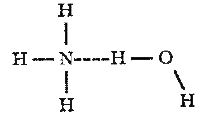Identify the correct statements from the following .
(i) Zn reacts with due dilute HCl and aqueous NaOH solution seperately and liberates hyrogen .
(ii)Ti and Zr from intesitial hydrides .
The viscosite of H2O is more than the viscosite of D2O .Solution in Telugu
(i),(ii),(iii)
(i),(ii)
(i),(ii)
(ii),(iii)
The correct Answer is:C
Zn(s)+2HCL(aq)→Zn2+(aq)+2CL−(aq)+H2(g) Zn comes into contact with HCL acid . It replace the hydregen from HCL molecules .
Zn(s)2HCL→ZnCl2+H2
(ii) Hydrides are classifield into three categories , according to the natuture of their bond intersitial hydrides have a matalic bond and d- block elements make intersitial hydries .
(iii) Viscosity of H2O is more then the viscosity of D2O .This statement is wrong .
Similar Questions
वक्तव्य I D2O का गलनांक H2O से ज्यादा होता है|
वक्तव्य II D2O की श्यानता सामान्य जल से अधिक होती है|
View SolutionSolubility of NaCl in heavy water is
View Solution5 g of Zn reacts with (I) Excess of NaOH (II) Dilute HCl, then volume ratio of H_2 gas evolved in (I) and (II) is
View SolutionComplete and balance the following chemical equations: (i) NaOH(aq)+Zn(s) to (ii) CaCO_(3)(s)+H_(2)O(l)+CO_(2)(g) to (iii) HCl(aq)+H_(2)O(l) to
View SolutionFrom water D_(2)O How is it made? D_(2)O State the physical properties due to which D_(2)O Differs from water. D_(2)O Describe at least three reactions that indicate exchange of hydrogen with deuterium.
View Solution(A) Cr^(+2) is strong reducing agent in aqueous solution. (R) Cr^(+2) cannot liberate H_2 from dilute HCl.
View SolutionStatement I: The correct presentation of existence of NH3 in water is

Statement II : The polarity of O- H bond is more than that of the N- H bond .
View Solution
